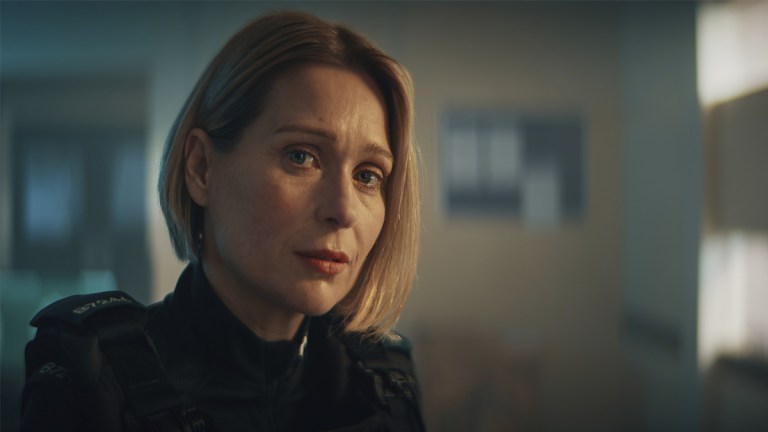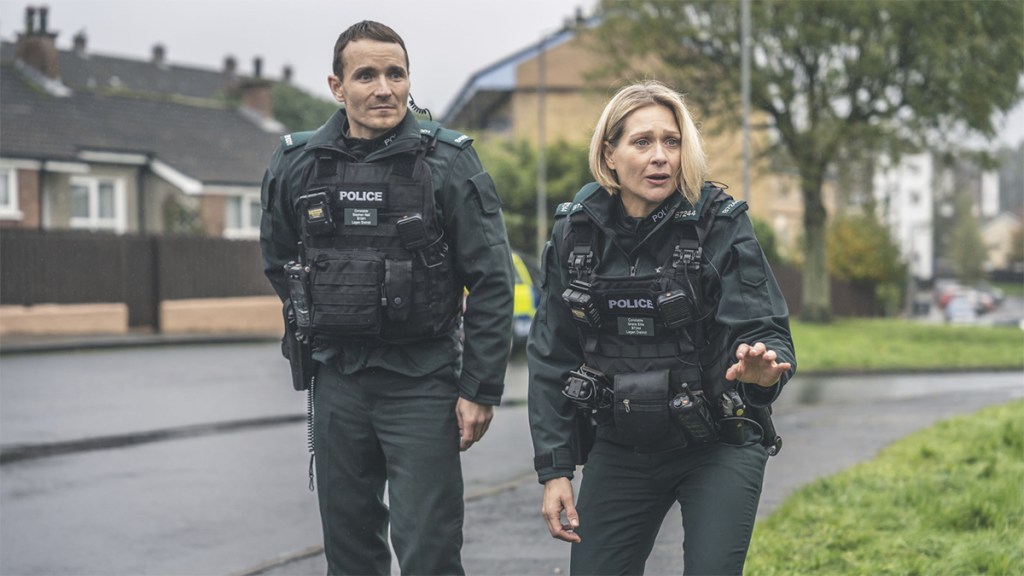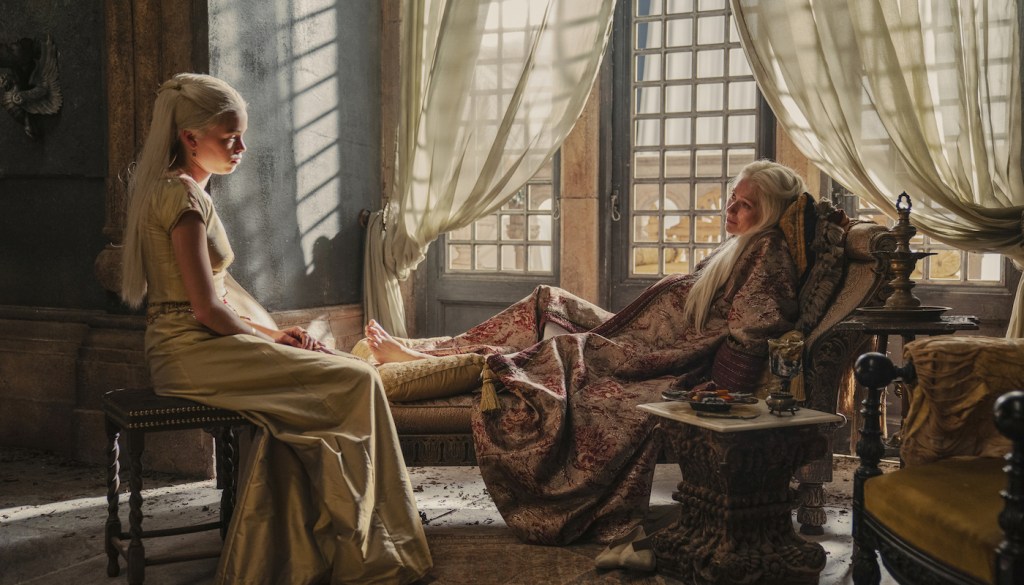“Where’s That Taxi Taking Grace and Stevie? Series 3!” Siân Brooke on the Blue Lights Ending
Exclusive: Brooke goes deep with Den of Geek into the series 2 finale...

Warning: spoilers for Blue Lights series 2.
The message in the Blue Lights series two finale could hardly seem clearer. After six episodes of being assaulted, petrol bombed and shot at on their turbulent Belfast patch, police officers Grace and Stevie finally give in to their feelings and drive off into the night while Dolly Parton’s “Light of a Clear Blue Morning” perkily assures us that “Everything’s gonna be alright/It’s gonna be okay.”
Phew. Thank heavens! If there’s one thing Siân Brooke’s Grace and Martin McCann’s Stevie deserve in Blue Lights, it’s for everything to be alright and okay. He’s a widower who nursed his beloved wife through cancer; she’s a former social worker and single parent whose only son has moved away, and they both do a job so stressful it’s a wonder that they don’t spontaneously burst into flames at the start of every shift. If these two can find solace in each other in the back of a Belfast cab, then work away.
But hang on a moment. Just before the finale credits roll, Grace and Stevie’s cab turns off and the Blue Lights camera keeps going, moving forwards and up. Dolly Parton’s promise of a clear blue morning disappears and as the night-time Belfast skyline is held in frame, the only sound is of police sirens. Is everything gonna be alright, gonna be okay?
Siân Brooke laughs. “You don’t often see it all working out happy families, but [Blue Lights creators Declan Lawn and Adam Patterson] might have different ideas,” she tells Den of Geek via video call.
Grace and Stevie’s taxi ride ending isn’t “totally resolute”, says Brooke. “It’s been two series of will-they-won’t-they? I’ve had the question so many times ‘Are they going to get together?!’, so I think they needed to give them something, but you still don’t know whether or not this is a proper commitment or just…”
A one-night hook-up?
“It could be, you just don’t know. They wanted to leave it in a place where yes, these two are evidently mad about each other, and finally they’re showing that to each other, but then also there’s an opportunity for it to go any which way.”
In answer to the question of what’s next for Grace and Stevie, Brooke denies all knowledge of what the plan is and laughs. “Where’s that taxi taking them? Series three!”

No guarantees of safety can be made for Grace and Stevie as the story continues (series three and four were commissioned at the same time) stresses Brooke. In the violent and unpredictable world of Belfast’s criminal underworld, will the characters even survive? She can’t say. “I mean, look what happened to Gerry,” she says in reference to Richard Dormer’s beloved character, killed in the line of duty during series one. Humbly, she hopes that her character will make it “at least a little way into series three.”
If I were a betting man, I’d put the house on it. Grace is one of Blue Lights’ masterstrokes. Her upright presence has become, over two series, a planet around which the show’s other satellites orbit. She isn’t just – in Brooke’s words – a mother-hen to fellow new recruits Tommy (Nathan Braniff) and Annie (Katherine Devlin), Grace is an almost-emblematic figure representing decency.
“We started filming Blue Lights when we came out of Covid, and for me [Grace] flies the flag of somebody who has a really strong moral compass and isn’t afraid to speak their mind if it means that they maybe get side-lined for a promotion or whatever it is.”
What Brooke isn’t saying but seems to be suggesting is that after the cowardly evasions, self-serving lies and ineptitude on display in high office during the pandemic, as well as the serious crimes committed by members of the police service in recent years, that honest, brave and “inherently empathetic” Grace Ellis is a comforting figure to watch, and a reassuring one to imagine going about her job.
“She’s braver than I am, ballsier than I am, cheekier than I am – all the things I’d love to be. I feel very lucky to play her.
“It says so much about her that at the age of 40-something, as a single parent, that rather than backing away from social work, which is incredibly gruesome and relentless and overwhelming, she decides, ‘I’m actually going to take a step nearer the fire’. At that point she feels frustrated that she can’t get as much done, so she needs to go to the crux of the problem to be able to deal with it better. I think that says a lot about her.”
The way Brooke works with character is to connect up the dots of their life, but those joined-dots don’t have to be made explicit to an audience. There’s mystery in Grace’s backstory (What happened with her son Cal’s dad? What made her leave social work to retrain with the police?) but Brooke is happy to leave some questions stand. “There are various things that I’ve made decisions about along the way, but [laughs and puts on deliberately overdramatic voice] I couldn’t possibly tell! I like that she’s slightly enigmatic in terms of you don’t totally know what that backstory is.”
Grace might be, by Brooke’s own estimation, braver, ballsier and cheekier than she is, but they share the same warmth and humour. Brooke laughs and jokes through our interview. She remembers, with palpable joy, winning the Best Prize Fight award at drama school (RADA, but I’m the one who name-drops it, not her) in an all-female version of The Three Musketeers. “We did rapiers and daggers!” she exclaims, comparing it to her handling of firearms in Blue Lights. When we talk about her role in the first episode of HBO’s House of the Dragon, in which her character dies extremely gorily in childbirth, she remembers cracking jokes between takes from her blood-soaked bed before losing her voice from the 48-hour screaming session.

When I ask for a tease of any new treats in Stevie’s “magic lunchbox” (gourmet cookery is the character’s hobby, and he and Grace bond over the snacks he brings in to work), she feigns delighted outrage at the idea that it’s a euphemism and then jokes about whether in series three, chef Stevie will step it up to a three-course lunch served in the patrol car from under a silver cloche. “A cloche! Such a great word in itself. Imagine Stevie there with a cloche!”
It’s no wonder it was a stretch for Brooke to play sociopathic prison inmate Eurus Holmes in Sherlock’s final series. “Total, total opposite to Grace. She just avoided emotion, avoided empathy, I know it sounds… but it’s quite hard to play somebody like that, especially when I go around hugging everybody! It was quite a departure but I loved it. I have such fond memories of that time, it was an incredible period in my life. Again, I think there’s something really sick and twisted about me because I loved playing her!” If Sherlock came back, Brooke would re-join the cast “in a heartbeat” she says, turning her chin up to elegantly mime playing the character’s violin.
Back to that taxi. Though she and Martin McCann filmed that scene months and months ago, Brooke remembers it well. When Grace got in the cab and rested her head on Stevie’s shoulder, the two actors didn’t speak. “It was very much a moment for these characters but because it’s the end of the series, it was also a moment for Marty and I to go ‘there we are, we did it!’ It was also very late at night so we were shattered.”
The scene just before it, where the police officers gather in a pub to drink and dance to a country and western band, was a joy to film. At the mention of Dolly Parton’s name, Brooke punches the air. “I love a bit of Dolly Parton!”
“That [pub scene] was probably about six weeks before we wrapped. Filming it was just amazing because we’ve all known each other for a long time now and we’re all a very close tight-knit family. I loved watching everybody’s little moments, because we’re all separated quite a bit during the filming in various cop cars so to then have everyone under one roof with the soundcheck of Dolly Parton in a pub! We weren’t able to drink,” she laughs, “so that was the only downside.”
Ultimately, says Brooke, Blue Lights might a drama about dark things (sectarian violence, paramilitary punishments, drug wars…) but as that ending shows, it’s essentially about human beings trying to do their very best. “At the end of the day, they won’t give in. I do think it’s about hope, in terms of these people and in terms of the location and where it’s set. That’s a strong thread throughout.
“That’s the beauty of it,” she smiles. The creators aren’t afraid not to pigeon-hole themselves in one genre, just action or thriller or crime, it’s got heart.”
It has. And thanks to Brooke, its name might be Grace Ellis.
Blue Lights series one and two are available to stream now on BBC iPlayer in the UK and on BritBox in the US.
